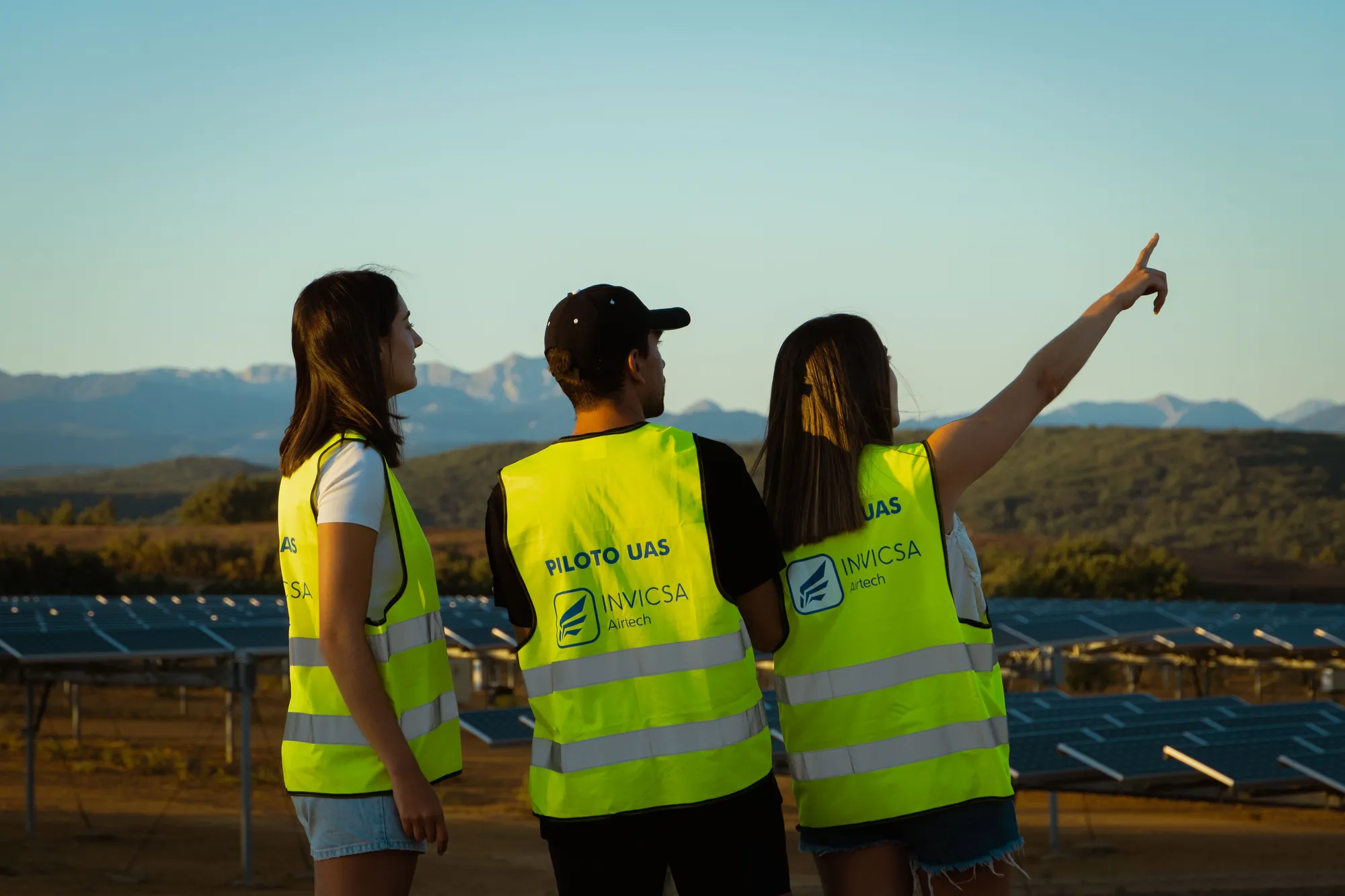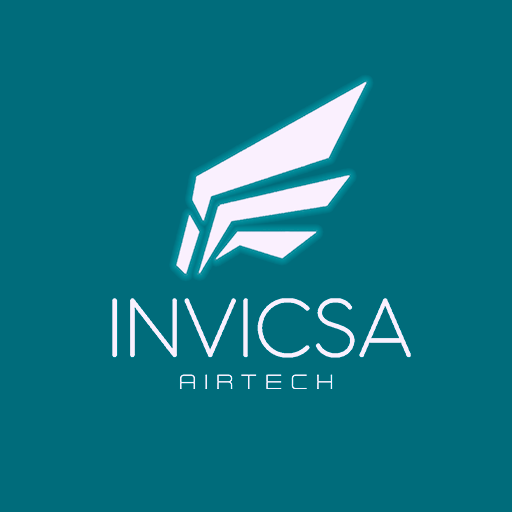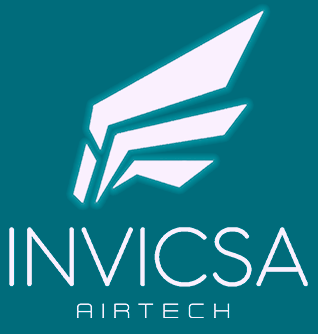DRONE PILOT TRAINING
Official courses, STS qualifications and AESA certification with maximum online visibility.
Get your drone pilot certificate with AESA certification with us.
The new European regulations severely restrict those who do not have official qualifications. For this reason, at Invicsa Airtech we offer you professional drone pilot training, with technical programmes, regulated and endorsed by AESA, adapted to different scenarios.
Whether you are a hobbyist, advanced operator or working professional, you need certification if you want to fly legally in urban, industrial or controlled environments.
Trained pilots.
What is
for?
This course qualifies you to pass the official AESA A1/A3 drone pilot exam, a prerequisite to fly drones up to 25 kg in the open category.
You will have the support of our instructors, individualised monitoring and assistance in the process of registering as a UAS operator with AESA.
We are with you
throughout the process
What is
STS-ES-01 and STS-ES-02?
- STS-ES-01: VLOS (within visual range) operations over a controlled land area in a populated environment.
- STS-ES-02: BVLOS (beyond visual range) operations with airspace observers over a controlled ground area in a sparsely populated environment.
In addition, the course contents cover the necessary knowledge to pass the training and the free online exam conducted by AESA to obtain the Open Category A1/A3 pilot certificate.
Practical lessons calls
every month
in different cities
THEORETICAL CONTENT
What does it include?
Contents to pass the A1/A3 AESA exam.
Arrangements with AESA to carry out the exams.
Category Specific theoretical training STS-ES-01 and STS-ES-02.
Theoretical training 100% on-line.
Theoretical meetings to reinforce and resolve doubts.
8 hours of practical drone flight training.
Practical exam.
Instructors with more than 2000 flight hours.
NEW! Basic training in flight planning. NEW! Joining the job pool for Invicsa Airtech operations.
PRICE
¡SALE! 375€
Get your official drone pilot license in less than a month
Get with us the official title of STS drone pilot to fly in standard scenarios STS-ES-01 and STS-ES-02 with all the guarantees of an entity recognized by AESA for the training and evaluation of remote pilots for operations in standard scenarios. The course has been designed by expert drone operations managers and aeronautical engineers from Invicsa Airtech, with more than 10 years of experience in drone piloting and operation.
STS-ES-01: VLOS operations over a controlled ground area in a populated environment.
STS-ES-02: BVLOS operations with airspace observers over a controlled ground area in a sparsely populated environment.
In addition, the course contents cover the necessary knowledge to pass the training and free online exam conducted by AESA to obtain the Open Category A1/A3 pilot certificate.
Enroll now and complete the training at your own pace. We adapt to your time. Internships are held every month in different cities.




What does the official STS drone pilot course include?
Theoretical content of the drone pilot course
Within this course you will find the theoretical contents necessary to easily pass the AESA theoretical exam for the STS-ES-01 and STS-ES-02 standard scenarios. In addition to all the information we make available to you, we conduct online group tutorials to resolve doubts and focus on the most important aspects.
- Introduction to EASA and the aviation system; and
- Commission Implementing Regulation (EU) 2019/947 and Commission Delegated Regulation (EU) 2019/945:
- Applicability to Member States;
- Standard Scenarios (STS);
- UAS operator registration and operational declaration;
- UAS operator responsibilities;
- Responsabilidades de los pilotos a distancia; y
- Notification of events, incidents and accidents.
Knowing the applicable regulations is the basis of any industry. In the least tedious way possible, the most relevant aspects of the EU Regulation and its applicability to the national scope will be explained, defining the training levels, the standard scenarios (STS) and the figures of operator, pilot and observer, as well as the responsibilities of each one of them. The categories of operations and classes of unmanned aircraft systems (UAS) will also be specified.
- The influence of psychoactive substances and alcohol, as well as when the remote pilot is not in adequate condition due to injury, fatigue, medication, illness or other causes;
- Effect of weather conditions on the crew; and
- Human perception:
- Factors influencing the pilot’s visual range (“VLOS”);
- Evaluation of obstacle clearance and distance between unmanned aircraft and obstacles
- Evaluation of unmanned aircraft flight speed
- Evaluation of unmanned aircraft flight altitude.
- Situational awareness
- Night operations; and
- Communication between different people involved in the operation.
A basic aspect of UAS operations is the pilot. Consequently, it is also essential to know the factors that can affect its performance and therefore the performance of the operation. The main causes that reduce human performance such as fatigue, illness and the ingestion of medication, alcohol or other psychoactive substances will be discussed and examples of the limitations of human perception and how weather conditions can affect pilots will be discussed.
- Pre-flight procedures
- Operation evaluation;
- Identification of a controlled ground area suitable for unmanned aircraft operations and in accordance with standard scenarios;
- Environmental conditions and methods for obtaining weather forecasts;
- Limitations and conditions applicable to the ground risk prevention zone according to the operations manual;
- Flight planning;
- Verification of UAS conditions and use of checklists.
- In-flight procedures
- Standard procedures; and
- Contingency and emergency procedures;
- Post-flight procedures
- UAS inspection and maintenance;
- Reports and details on operation and registration.
UAS operations extend beyond the flight itself. Not only the in-flight procedures but also the pre-flight and post-flight procedures must be known. Pre-operation planning is key to its effectiveness and safety. In the preparation of the operation, the flight area must be analyzed and the possible associated risks must be foreseen, as well as the weather conditions and the equipment to be used. During the flight, not only the normal flight procedures must be taken into account, but especially the procedures in case of any anomaly or emergency, situations for which the pilot must be prepared. In addition, the actions to be taken once the flight is over will be explained, including the recording of the operation information and the inspection and maintenance of the systems.
- Definition of the operational volume, reinforced by height and speed limitation systems;
- Consultation of airspace limitations through official sources; procedures for updating and uploading airspace limitations to the geo-awareness function;
- Evaluation of flight geography:
- Procedures required for UAS operations in controlled airspace, including a protocol for communicating with air traffic control and obtaining coordination and instructions, if necessary;
- Coordination with airfield managers for UAS operations, if necessary;
- Selection and evaluation of airspace information that may have an impact on the planned operation;
- Airspace monitoring and remote pilot coordination with airspace observers:
- Proper placement of airspace observers;
- Solid and effective means of communication;
- Phraseology;
- Definition of basic actions to be taken in cases of emergency, including problems with the UAS or the occurrence of a mid-air collision hazard during an operation.
- Specification of an effective emergency response plan appropriate to the operational scenario;
- See-and-avoid procedures.
In order to offer a safe operation, the first thing to know is the risks. Based on the risks of the operation, the necessary measures to eliminate or at least reduce them should be analyzed. To reduce risks in the air, i.e. a collision with another aircraft, it is important to define the volume of the operation and respect it, to avoid invading the airspace of other users or being limited for any reason. For this purpose, there are several procedures that will be explained in this chapter, which are applied in the planning of the operation as well as in its development.
- Advanced flight principles;
- Environmental limitations of UAS;
- Flight assistance systems and possible failures
- GNSS;
- Inertial sensors;
- Compass.
- Command and control principles:
- General knowledge;
- Link frequencies and spectrum;
- Flight modes;
- Safety systems.
- Requirements applicable to unmanned aircraft carrying class C5 and C6 markings;
- Familiarization with the user manual provided by the UAS manufacturer.
Another basic aspect in UAS operation is, precisely, to know the UAS and its main components. This chapter will develop the operating principles of unmanned aircraft and their systems, such as positioning and navigation systems, link and control systems and basic safety systems. The importance of knowing and understanding the instruction manual of each aircraft to be used will also be emphasized.
- The effect of weather conditions on the flight of an unmanned aircraft:
- Wind (e.g. turbulence, effects in urban environments, etc.);
- Temperature;
- Visibility; and
- Air density;
- Obtaining weather forecasts;
Weather is a very important conditioning factor in the development of a UAS operation. They can significantly affect the performance of both the aircraft and the pilot. It is therefore necessary to know the basics of meteorology applicable to air operations, its impact and how to obtain forecasts, to be taken into account in planning.
- Typical operating envelope of a gyroplane, a fixed-wing aircraft and a hybrid configuration aircraft;
- Center of gravity (CG) and mass balance:
- Consider overall stability when installing gimbals and payload;
- Understand the different payload characteristics and how they affect the stability of the unmanned aircraft in flight; and
- Understand that different types of UAS have different CG;
- Securing the payload;
- Batteries;
- Understand the operation of the power supply to help prevent possible unsafe conditions;
- Familiarization with the different types of existing batteries;
- Understand the terminology used for batteries (e.g. voltage, capacity, charge and discharge, C-rate, etc.); and
- Understand battery operation (e.g., charging and discharging, installation, use, storage, hazards, etc.).
In relation to the knowledge of the UAS, the principles of flight and mass balance must be emphasized in order to obtain the necessary stability. These somewhat specific aeronautical concepts will be explained in a way that is accessible to the general public. Battery performance characteristics, a fundamental component in UAS, will also be discussed.
- Low speed mode function;
- Evaluation of the distance to non-participants in the operation;
- Rule 1:1.
What is
for?
With the official Radio Operator certificate you will obtain the necessary skills and knowledge to communicate with the control tower of an airport and will be able to fly in controlled airspace.
This is a mandatory certification for all drone pilots wishing to perform operations within the CTR (Controlled Traffic Region) of an airport.
100% online training
In your own time. From anywhere.
What does it include?
Access to an online platform with extensive content.
Theoretical tutorials to reinforce and resolve doubts.
Practical training by videoconference of 5 hours.
Commercial aviation instructor pilots with extensive experience in
communications.
Instructors with more than 3000 hours of RPA flight time.
¡NEW! Joining Invicsa Airtech's operations job pool.
AESA official drone radio operator course
100% online training
With the official Radio Operator certificate you will obtain the necessary skills and knowledge to communicate with the control tower of an airport. Our Aeronautical Radiophonist course for drone pilots will allow you to fly in controlled airspace.
This is a mandatory certification for all drone pilots wishing to perform operations within the CTR (Controlled Traffic Region) of an airport.
Enroll now and complete the training at your own pace. We adapt to your time. Internship calls every month.



What does the official radio operator course include??
Theoretical content of the Drone Radiophonist course
Within our course you will find the theoretical contents necessary to perform safe operations in airport environments. In addition, case studies of real operations with RPAs within the controlled environment of an airport will be presented.
-
Airspace classification and air traffic services
-
Principles of radiotelephony and communications
-
Radiotelephony and communications
-
Radio procedures
-
Emergency procedures
-
Definitions and abbreviations
-
Radiotelephone communications
-
Radiotelephone transmission techniques
-
Airfield traffic
- Review of the theoretical knowledge acquired through the platform.
- Case studies with RPAs within controlled airspace and radio range
- Theoretical and practical examination
Specialised drone courses for different professional profiles
Do you need to fly drones for a specific activity?
At Invicsa Airtech we offer specialised drone courses adapted to the different job opportunities in the sector.
Thanks to technical training certified by AESA, our programmes prepare you to operate drones safely and in accordance with current European regulations.
Transform
knowledge into
opportunity
What does it include?
- Course in audiovisual production with drones: Learn how to make professional aerial recordings for film, television or events.
- Course in phytosanitary applicator with drones: Specialise in the use of drones as a phytosanitary applicator, with which you will also be able to carry out crop analysis, NDVI mapping and localised application of phytosanitary products.
- Course on technical inspections with drones: Master the use of drones to inspect infrastructures, power lines or solar parks.
- Drones for emergencies and civil protection course: Training for search, surveillance and fire control tasks with UAS.
- Course on topography and cartography with drones: Learn how to generate high-precision digital terrain models and orthophotos with drones.
- FPV drone course: for those who want to master manual flight, immersive cinematic recording or compete in high-speed races with precision and safety.
ADVANTAGES OF TRAINING AT INVICSA AIRTECH
Automatic obstacle detection and avoidance
Adaptation in real time to changes in the environment
Adaptation in real time to changes in the environment
fleet management platforms
We have already trained pilots in these places.
Shall we complete the map together?
Collaborating entities

What they say about us

Totalmente recomendables tanto para formarte como para encargarles cualquier proyecto.
Gracias por vuestra dedicación, por la paciencia con la que enseñáis, por la generosidad al compartir vuestro conocimiento y por la alegría que transmitís en cada clase.
De verdad, ha sido un aprendizaje enriquecedor no solo a nivel técnico, sino también personal. 🌟
Daniel Naredo.
Muchas gracias.
Un curso muy bien aprovechado.
Muy recomendable.














